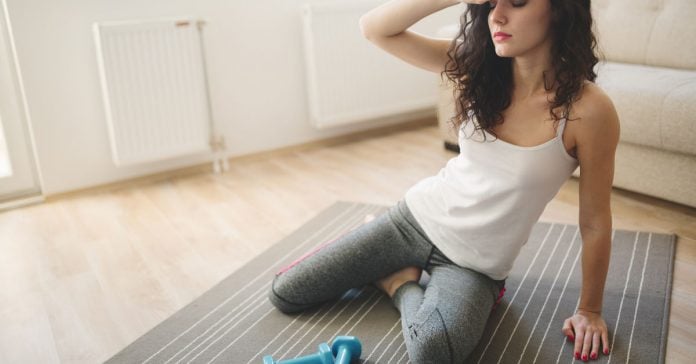Fitness enthusiasts work out even when they are sick. Not so enthusiastic gym-goers, on the other hand, will find the slimmest illness excuse to skip the gym. But between these two groups of people, who is right? Is working out while sick a positive or negative thing? Well, working out on a regular basis helps you to remain healthy and minimize the effects of chronic illnesses such as heart conditions and diabetes. Regular exercise is also known to boost body immunity. That is why this post focuses on exercises, how they help you recover from illness, and how to do it best for optimal benefits.
How Can You Know If You Are Too Sick To Exercise?
Workout experts say that the best way to know whether or not you are too sick to exercise is to pay attention to the extent of your symptoms and their location. If the symptoms are below your neck, it is to your best interests not to exercise. If they are from your neck up, it is relatively safer to engage in physical exercise. The illnesses that you can have and still exercise include sore throat, mild headache, or running nose. Working out will aid your recovery process in that case.
However, if you have a productive cough, fever, stomach upsets, or a tight test, vigorous exercising can easily exacerbate the illness. Such illnesses need your body to focus all its energy on fighting and trying to recover from whichever infection that has rendered it sick. You. cannot afford to waste any energy on muscle function. The key is to listen to your body, take a break from exercise if you must, or jump on your classic bicycle if you feel okay.
Sweating Out a Cold or a Flu
Sweating out a cold or flu is okay, but you need to be careful not to dehydrate your body while at it. When your body is fighting a cold, what it needs most is tons of fluids to loosen the congestion that comes with the infection, keep the mucous membranes in your respiratory tract fully functional, and to reduce the itchy feeling on your throat. Note that you lose a lot of water through sneezing and watery eyes. The bottom line here is to sweat the flu out, but drink plenty of water while at it.
Important: When sweating a cold out, be sure to clean your equipment thoroughly immediately after use, then wash your hands. That will prevent the gathering of germs on the equipment, which would be risky as flu is a viral infection that spreads extremely fast.
How Exercise Can Help You with Cancer & HIV Therapy
Oncologists recommend exercise therapy for cancer patients for two reasons. First, exercise is known to effectively modulate a patient’s immune system. Secondly, there is an unconfirmed possibility that regular physical exercise increases NK cell activity for patients with cancer and boost lymphocyte proliferation. For HIV patients, on the other hand, regular exercise boosts cardiovascular health and increases CD4+ cells. That, in turn, prevents muscle wasting, improves mood, and helps patients to live a happier life.
How Does Exercise Affect Your Immune System?
We have mentioned on several occasions that exercise may play an important role in our immune system. But how does that happen? Well, brief vigorous exercise such as morning jogs and biking boosts both our innate and our adaptive immune response. The strength of your adaptive immunity is particularly dependent on moderate, regular exercises, while innate immunity grows with an increase in your chronic resistant training.
How often should you exercise for an improved immunity? Scientists have varied opinions as to how much training is too much, but most of them agree that exercising vigorously (say running a marathon) once a month is okay. On the other hand, 3 mild exercises per week are fine, although there aren’t any conclusive findings that show negative effects on the immune system due to everyday training. To be safe, ride your classic bicycle to work every other day.
Conclusion
The takeaway point here is that working out when ill will not necessarily lower your immune system, but there are times when it is unwise to waste too much of your energy on exercise. Don’t make things worse just to prove a point to your close associates that you are a workout animal. Find a way of reaching your fitness goals without jeopardizing your health.
Guest post: Ron Utrilla is a bicycle tester at BikeBerry. He is a big advocate that everyone should be more active in their lives. He works really hard on his projects and tries to find ways that everyone can get into fitness in an easy and approachable way.


